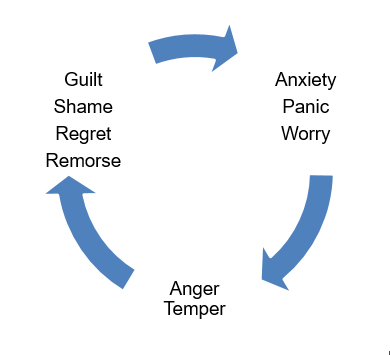Bev's Blog
The Three Pillars
For many troubled people, what we see as their problem is often seen by them as their solution. Take overeating for example. Food makes them feel good about a difficult life. Food is their emotional solution.
NLP suggests that every behaviour has a positive intention. In other words, every problem is actually an attempted solution:
• The anorexic starves to solve the problems of control in her life.
• The alcoholic drinks to relax, or whatever.
• The angry person gets angry to try and solve the frustrating situation.

Let’s look at this using the above pattern. Most of us know people who have an awful personal history. If that person goes to solution focused therapy, the therapist may get them to focus on the future. They might now have a better future, but it won’t necessarily help them with their past.
Guilt, remorse, regret and shame are emotions that relate to past events. They do not disappear just because you're focusing on the future now.
Anxiety, panic and worry are emotions which relate to the future. If you go to a therapist with anxiety issues and the therapist does some past exploration, you’ll gain insight as to the cause of your anxiety, but your anxiety won’t be resolved by looking at the past. Thinking about an awful past may elicit unpleasant emotions and feelings. One way to escape this is to think about the future and to fantasize about a better life. Many people stay in difficult marriages or unpleasant work environments while fantasizing about a more pleasant future every night. However, they don’t do anything to change their situation and before they know it, another decade has slipped by and their lives haven’t changed. Some people’s problems are future orientated.
They have anxiety about the future. It brings them a sense of panic. How do they escape that suffering? They think about the past. They romanticise either their personal past and think about the time when everything was beautiful or a social time long gone , say ,when everyone left their doors unlocked. That nostalgia takes them away from the pain of the future.
Here’s another example: Someone might say, “My past was really difficult and thinking about the future stresses me. I can escape those emotions by feeling angry all the time. Anger keeps me in the present, but more importantly, I can get angry with you!! Not only does anger stop me from thinking about the past and the future, it stops me from thinking about myself because I’m really only angry because of other people and the way they behave”! Anger and temper keep it about everything that it isn’t. “It’s all about you and there’s nothing wrong with me.”
So if you have pain from the past, you can fantasize about the future. If you have anxiety about the future you can be nostalgic about the past. If you can’t do either of those, you can be angry.
If you can’t maintain weight loss these emotions might be arising not as a fantasy, but as an escape itself? Feelings of guilt, shame, regret and remorse are endemic.Your life may be governed by these emotions. Whilst focusing on regret, guilt, shame and remorse, you aren’t able to think about the future.
Even though these emotions are painful, they will prevent you from making decisions about your body, and what a healthier future would look like. These emotions prevent change. The time you spend focusing on the guilt of past actions, doesn’t allow you to focus on making changes for the future. When you no longer feels remorse, guilt or shame around eating behaviours, you will become more flexible to change.
So, pay attention to your eating emotions. How many emotions come up that you’re very quickly able to distract from?
See if you can open up emotional and behavioural flexibility. Take every problem behaviour and ask yourself, "What is this a solution to?"

